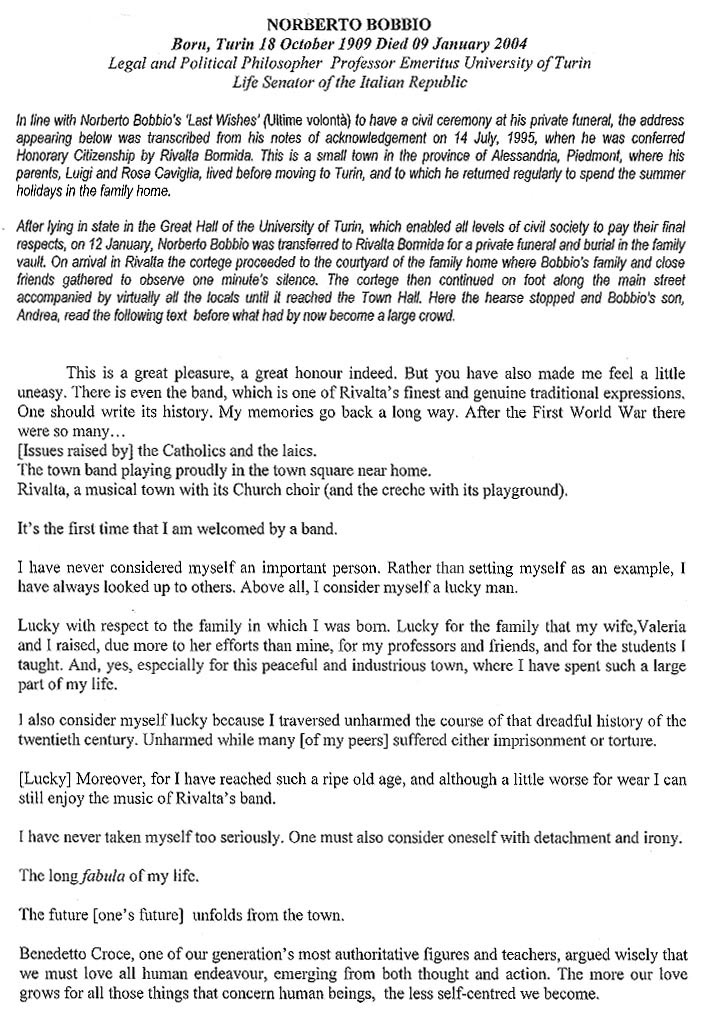


NORBERTO BOBBIO
Norberto Bobbio's life ebbed away peacefully and privately at the Molinette hospital, as the winter sun set upon the snowcapped mountains that encircle his beloved Turin in Piedmont. Valeria, his devoted wife for almost fiftyeight years predeceased him on 22 April 2001. Written by Bobbio on 4 November 1999, the following text expresses his wish for a simple process to accompany his earthly passage. The text was read by Bobbio's son, Andrea, in the presence of the Italian President, Carlo Azeglio Ciampi, in the Great Hall of the University of Turin, where Norberto Bobbio lay in state, and subsequently published in its entirety in the Italian Press. My Last WishesOn 18 October I turned ninety. Death is getting closer. In fact, all my life I felt it near. I never thought I would live so long. I am tired, despite the loving care that my wife and sons, and family bestow upon me. It happens that often in my conversations or letters I use the expression 'deathly tiredness'. The only remedy for 'deathly' tiredness is the rest that death provides. Requiem aeternam dona eis domine [God grant them eternal rest]. In the final beautiful chorus of Bach's St. John's Passion, immediately after the death of Christ the choir sings: Ruht wohl (Rest in peace). It is my wish and agreed to by my wife and sons that my funeral should take the form of a civil ceremony. In a personal note of more than thirty years ago (10 May 1968) I wrote that I wished to have a civil funeral ceremony. I do not believe that I distanced myself from the religion of the Fathers but rather from the Church. That happened too long ago for me to return stealthily at my final hour. I consider myself neither an atheist nor an agnostic. As a man of reason rather than faith, I am aware that I am steeped in the mystery that reason is incapable of penetrating, and which the various religions interpret in different ways. Rather than a State funeral I would like the ceremony to be simple and private. I warmly entreat my family to fulfil this wish. During my lifetime, and on the occasion of my ninetieth birthday, I received public acknowledgements, academic prizes, and a variety of honours have been conferred upon me, which I accepted even though I am convinced they exceeded my merits. Death calls for silence: the collection of personal thoughts, reflection and the intimate emotions of one's closest relations. My wish is for a brief ceremony at home, or, if the situation requires it, in hospital. There should be no speeches. There is nothing more rhetorical or tiresome than eulogies. Then, there is the transfer to Rivalta Bormida for my burial in the family vault. Only my name and surname, dates of birth and death are to be written on the tombstone, followed by the caption 'Son of Luigi and Rosa Caviglia'. I am content with the thought that my name will appear on my tombstone together with that of my parents. My father, who came from Alessandria, was the founder of the Bobbio family in Turin. He arranged for the family vault to be built in his wife's town that he loved so much. Besides, my name linked with that of my parents provides a sense of continuity of generations. The family should make the announcement once the funeral has taken place by an obituary written in simple words, in the way that such notices are usually done for ordinary people:
...... sadly announce that
|


